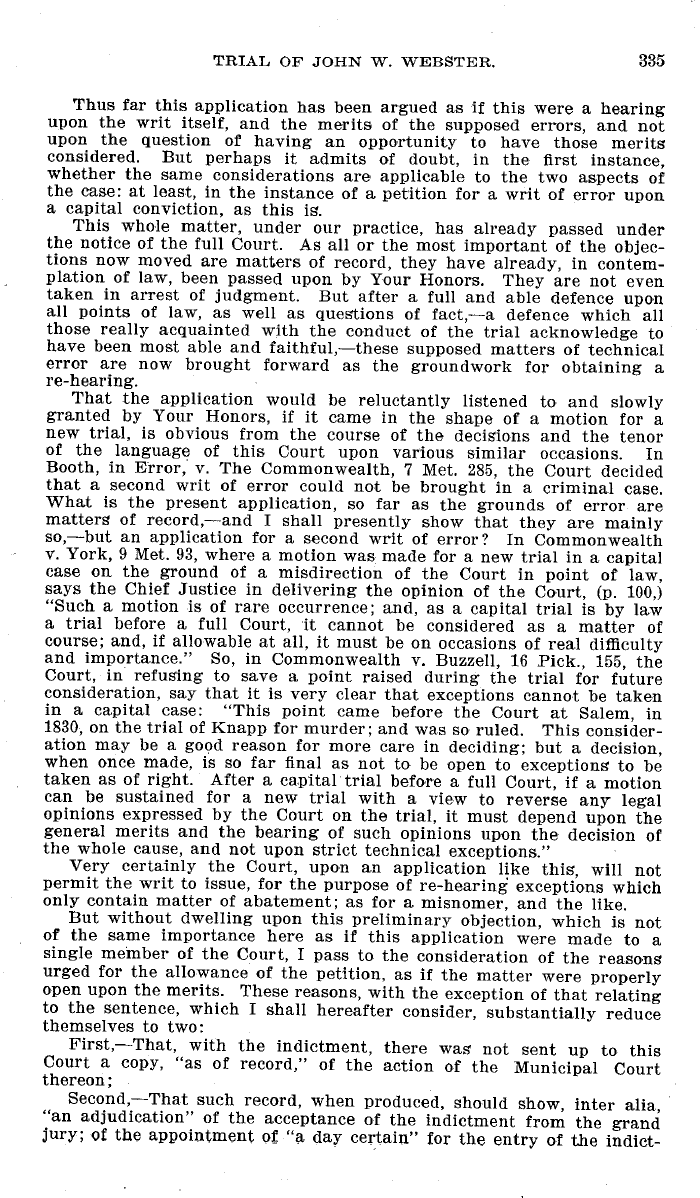|
TRIAL OF JOHN W. WEBSTER. 335
Thus far this application has been argued as if this were a hearing
upon the writ itself, and the merits of the supposed errors, and not
upon the question of having an opportunity to have those merits
considered. But perhaps it admits of doubt, in the first instance,
whether the same considerations are applicable to the two aspects of
the case: at least, in the instance of a petition for a writ of error upon
a capital conviction, as this is.
This whole matter, under our practice, has already passed under
the notice of the full Court. As all or the most important of the objec-
tions now moved are matters of record, they have already, in contem-
plation of law, been passed upon by Your Honors. They are not even
taken in arrest of judgment. But after a full and able defence upon
all points of law, as well as questions of fact,-a defence which all
those really acquainted with the conduct of the trial acknowledge to
have been most able and faithful,-these supposed matters of technical
error are now brought forward as the groundwork for obtaining a
re-hearing.
That the application would be reluctantly listened to and slowly
granted by Your Honors, if it came in the shape of a motion for a
new trial, is obvious from the course of the decisions and the tenor
of the language of this Court upon various similar occasions. In
Booth, in Error, v. The Commonwealth, 7 Met. 285, the Court decided
that a second writ of error could not be brought in a criminal case.
What is the present application, so far as the grounds of error are
matters of record,-and I shall presently show that they are mainly
so,-but an application for a second writ of error? In Commonwealth
v. York, 9 Met. 93, where a motion was made for a new trial in a capital
case on the ground of a misdirection of the Court in point of law,
says the Chief Justice in delivering the opinion of the Court, (p. 100,)
"Such a motion is of rare occurrence; and, as a capital trial is by law
a trial before a full Court, it cannot be considered as a matter of
course; and, if allowable at all, it must be on occasions of real difficulty
and importance." So, in Commonwealth v. Buzzell, 16 .Pick., 155, the
Court, in refusing to save a point raised during the trial for future
consideration, say that it is very clear that exceptions cannot be taken
in a capital case: "This point came before the Court at Salem, in
1830, on the trial of Knapp for murder; and was so ruled. This consider-
ation may be a good reason for more care in deciding; but a decision,
when once made, is so far final as not to be open to exceptions to be
taken as of right. After a capital trial before a full Court, if a motion
can be sustained for a new trial with a view to reverse any legal
opinions expressed by the Court on the trial, it must depend upon the
general merits and the bearing of such opinions upon the decision of
the whole cause, and not upon strict technical exceptions."
Very certainly the Court, upon an application like this, will not
permit the writ to issue, for the purpose of re-hearing exceptions which
only contain matter of abatement; as for a misnomer, and the like.
But without dwelling upon this preliminary objection, which is not
of the same importance here as if this application were made to a
single member of the Court, I pass to the consideration of the reasons
urged for the allowance of the petition, as if the matter were properly
open upon the merits. These reasons, with the exception of that relating
to the sentence, which I shall hereafter consider, substantially reduce
themselves to two:
First,-That, with the indictment, there was not sent up to this
Court a copy, "as of record," of the action of the Municipal Court
thereon;
Second,-That such record, when produced, should show, inter alia,
"an adjudication" of the acceptance of the indictment from the grand
jury; of the appointment of "a day certain" for the entry of the indict-
|

